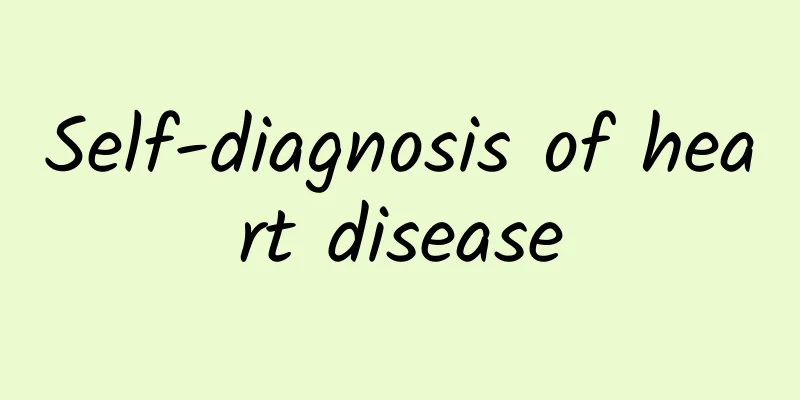Self-diagnosis of heart disease

|
Heart disease is a disease that seriously threatens our lives. Many people die from heart disease every year. Therefore, it is very important to learn self-diagnosis of heart disease and effectively prevent its occurrence. Heart disease is different from other diseases. This disease comes quickly and goes away quickly. If heart patients do not take care of their bodies, they are in danger of losing their lives at any time. So, how do you self-diagnose heart disease? Let’s learn together how to self-diagnose heart disease. Many people in life suffer from heart disease. Among heart disease patients, it is common among the elderly and middle-aged people. What's more, due to genetic factors, many minors also suffer from this disease. Because of this disease, they cannot lead a normal life or have a normal job. 1. Palpitations, fatigue, shortness of breath, or difficulty breathing during physical activity; this is something you can feel yourself during the diagnosis of heart disease; 2. When you are tired or nervous, you may suddenly experience pain behind the sternum or a feeling of tightness and oppression in the chest; 3. Pain in the left chest accompanied by sweating, or pain radiating to the shoulder, arm and neck; 4. A pulse that is too fast, too slow, short or irregular, which you can feel yourself in the diagnosis of heart disease; 5. Feeling palpitations, chest tightness or chest pain after having a full meal, being cold, smoking, or watching a tense movie or TV show; 6. Waking up suddenly from a deep sleep or nightmare, feeling palpitations, chest tightness, and difficulty breathing, and needing to sit up for a while to get better; 7. Feeling of difficulty breathing, chest tightness or chest pain during sexual intercourse; 8. In public places, you may feel chest tightness, difficulty breathing, and lack of air; 9. Hypertrophy and deformation of the ends of fingers or toes are also diagnostic criteria for heart disease; 10. When going upstairs, you are more likely to experience palpitations and shortness of breath than before or compared to others; 11. Sudden onset of palpitations, dizziness, blacking out, and a feeling of falling; 12. Long-term left shoulder pain; 13. The child's mobility is worse than that of his peers. When he is active, he feels palpitations, shortness of breath, fatigue, and blue lips; 14. After catching a cold, even slight exertion may cause palpitations and fatigue, or shortness of breath when walking a little faster; 15. Sudden chest discomfort and fainting on the ground, or feeling like you are about to "die"; 16. When sleeping with a low pillow at night, you feel difficulty breathing and need to sleep with a high pillow, and your lower limbs become swollen; 17. Abnormal colors such as purple, dark red, etc. appear on the face, lips, and nails; 18. You feel an abnormal heartbeat when you are at rest, or a tremor when you touch the heart area on the front chest wall with your palm; 19. Palpitations, dizziness, shortness of breath or edema during pregnancy. After reading the above introduction, do you know how to self-diagnose heart disease? If the symptoms described above appear, we can preliminarily conclude that you have heart disease. At this time, you must not do any large-scale exercise. You should sit down or lie down to have a good rest, take some tranquilizers, and let yourself rest quietly for a while. If the condition still does not improve, you should go to the hospital for treatment. |
>>: What to do if you have dizziness
Recommend
Can I eat black beans while taking Chinese medicine?
Although black beans are a very common food, ever...
Ointment for closed comedones
Oily skin is prone to closed comedones, which can...
The role of standard myrtle
Standard myrtle is mainly used to treat chronic s...
Difference Between Bacteria and Fungi
Although bacteria and fungi have very similar nam...
Causes of acne on the body
What causes acne on the body? Acne is very common...
What is the best food for dry mouth and bad breath?
If you experience dry mouth and bad breath in you...
The efficacy and contraindications of flat grass
Polygonum multiflorum, also known as powdery gras...
Brown leucorrhea, odorless, painless and itchy
Normal leucorrhea of women is a colorless or wh...
Why does a man’s urine turn yellow? What causes it?
The condition of a man's urine often reflects...
The role of tin foil
Tin foil is not unfamiliar to everyone. It is a co...
Can sweat steaming remove freckles?
Sweat steaming is a new way of health preservatio...
The efficacy and contraindications of Artemisia selengensis
Gnaphalium is a common Chinese herbal medicine in...
What does liver and kidney homology mean?
The liver and kidney are of the same origin, whic...
Is there an artificial womb?
Although the uterus is a reproductive organ that ...
First aid for epilepsy
Have you ever seen a person with epilepsy? People...









